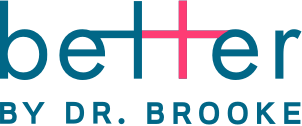
A common question for women who are not good candidates for HRT or are otherwise unsure about using hormones to help with perimenopause and menopause is this:
Can I just use supplements and nutrients instead of prescription hormones to help me get through perimenopause and menopause?
With all the popularity of HRT right now many women feel they must be on some form of estrogen but for a variety of reasons not every woman can or should be on hormones, but they need support as well. Luckily there is a world of support out there to help your HRT function better if you’re on it AND provide options for women who are not good candidates for HRT such as those with specific cancer risks.
If you have questions about risks, common terms used in HRT conversation, etc., these articles will be helpful:
What Women Need To Know About HRT
The Truth About Compounding Pharmacies
Understanding Bioidentical vs. Synthetic Hormone Replacement Therapy
Supplements Targeted For Midlife
Supplements containing various nutrients and botanicals targeted at women dealing with a host of midlife hormone issues like weight gain, hot flashes and insomnia are marketed everywhere you look right now. And if you’ve Googled common perimenopause symptoms like insomnia, anxiety, weight gain and hot flashes – then your social media feed is likely full of marketing for a lot of supplements targeted at hormone balance or hormone support.
But how do you choose something helpful and worthwhile?
While midlife care is having a moment, most of these herbs and nutrients have been used for a very, very long time by naturopathic and functional medicine docs. So now in fresh, new packaging, most are nothing new. However, we are always learning more about how these compounds work and that research is important to back up decades of use in clinical practice.
I use supplements and botanicals a lot in my practice for gut health, blood sugar balance, sleep issues, stress support, period problems, fertility help and of course to support women going through the hormone chaos from perimenopause and menopause.
While I always recommend working with a knowledgeable provider to know what’s best for you and hopefully based on some degree of appropriate testing, this article will help you sift through sift through the products out there and give you some things to consider whether or not a product would be helpful for you.
Here are a few important questions to ask as you ponder if the latest, greatest midlife supplement is for you:
Is The Dose Meaningful?
Put simply: there isn’t enough of the active ingredient in so many supplements, while not harmful, it may not be helpful either.
Without oversight, there is not a standard dose or an herb or herbal extract in a formulation. Using pharmaceutical, physician only brands is a good start but professional guidance is always warranted. Sometimes natural compounds are better delivered in a standardized extract vs. whole powdered herb as seen in many products and a certain dosage is required for an effect and that is often not seen clearly on many product labels. For example,many formulas contain proprietary blends which is not always a bad thing but it can make it unclear for you to know if you’re getting enough of the ingredient to help you.
Consider a fav herb of mine which is vitex. I often recommend 200-500mg of a standardized extract once or twice daily and if a formula has vitex as part of a blend you have no idea if you are getting that much. Ingredients are often listed in order of volume with the herbs at highest concentrations listed first, but even then you can’t tell if you’re getting enough.
Is It Even Something You Need?
This might be the biggest issue I see for women sussing out hormone related products: do they even need this particular thing to revolve their symptom or reach their goal?
Often supplements are blended to hit a variety of hormone mechanisms including metabolism of a hormone or even boosting a hormone, which may or may not be the root cause of what you’re going through – especially in perimenopause and menopause.
For example, many estrogen supportive products contain nutrients like DIM (di-indole methane) that helps metabolize estrogen, but you may or may not need support for this one particular estrogen detox pathway. You may instead need to temper estrogen fluctuations or better balance your estrogen and progesterone ratio. In fact, speeding up estrogen clearance may be the last thing you need – especially if your estrogen is low.
Also many “female hormone blends” have both estrogen and progesterone support, say maca and vitex, and you might need one during part of your cycle and not the other OR you may only need progesterone support and not estrogen support.
As well, sometimes formulas are better suited to support women with low hormones due to stress or non-ovulation due to issues like hypothalamic amenorrhea or PCOS. These might include adrenal adaptogens (i.e. ashwagandha) or blood sugar nutrients (i.e. berberine) that may not target the root cause of hormone issues in perimenopause which is fluctuating and ultimately waning estrogen and progesterone levels. In short, the strategy that works to raise progesterone in our 20s and 30s isn’t the same as what works in our 40s and 50s.
That said, yes of course women in perimenopause and menopause often ALSO need both adrenal and blood sugar support. Point being, many hormone formulations are a mish mash of common ingredients that may or not really target the main mechanism behind your hormonal symptoms. Leaving you frustrated and out a few – or a lot – of bucks.
Long story short here is that there are good and bad supplements out there. As well, there are a host of perfectly fine products that simply might not be well suited for you – at least right now. Getting professional guidance for the win! But so that you can better navigate what’s out there, grab the FREE guide for some key categories for female hormone supplements to better understand what’s in that bottle Instagram wants you to buy.
Dr Brooke’s Supplement Guide for Women’s Hormones
This FREE guide is meant to help you better understand what ingredients are most commonly found in these perimenopause, menopause and female hormone support formulas so you can better determine if a product is any good or if it will be helpful or not for you.
GET MY COPY
Will Supplements Get Your Hormone Levels As High As Taking Hormones?
With the exception of actual hormone supplements like melatonin, DHEA and topical progesterone cream, herbs and botanical compounds typically do not raise hormones to the same level as taking the actual hormone.
There are exceptions such as licorice (which increases the half life of cortisol, thus it can raise our cortisol levels) and herbs like maca that can overtly raise estrogen and testosterone. Even in these cases though, levels are typically not as high as taking prescription doses of estrogen, progesterone or testosterone.
However, just because they don’t raise it to the same level as taking the prescription, that doesn’t mean there isn’t benefit or that they might be a good call for you, especially if you are not planning to do HRT. I do though of course recommend you work with a knowledgeable provider vs. just clicking ads on Instagram so that you can get on a regimen that addresses your specific needs.
In effort to help you understand the types of hormone support products out there grab that guide I created to understand the various types of compounds out there and how they might work in a formula marketed as a hormone support or hormone booster. Again, these might be part of a regimen in conjunction with HRT or in lieu of if not doing HRT is a better choice for you.
At the end of the day we have a ton of botanical and nutritional tools available and there’s so much support out there for women – we just want to use the right tool for the job.
These supplemental products are best used under the guidance of a professional so that you know better target where you specifically need support and that your supplements work in tandem with and not interfere or interact with your hormone medications. As well, like using hormone prescriptions there are some women who should not be using certain herbal supplements to impact their hormones due to safety concerns.
And don’t assume that nothing natural will help with your symptoms if a product doesn’t work for you. It may be a bad product or it might not have been what you need. For example. you need a SERM (selective estrogen receptor modulators, like black cohosh) when you got something meant to clear out estrogen (i.e. DIM) but both products are labeled as “estrogen support formula”.
Or, you may just need more guidance.
This Isn’t Our Mama’s Menopause
Women today have so many more options and better access to higher quality products both over the counter andvia prescription than our mothers had for their menopause and this is a very good thing! It’s important though to know the mechanism in which a nutrient or plant compound works so that you can best choose products that will help your particular issue or concern as well as be safe to take with other supplements and prescriptions.
As well we do need to understand that while turmeric and black cohosh are not the same as an estrogen patch, that doesn’t mean supplements can’t have value for you.They might be part of a comprehensive approach that can help you feel your very best, minimize side effects of HRT and allow you to do better – which is the whole point right?
It’s hard out there with so much dogma and black and white opinions when it comes to HRT and supplements. The truth is there is a place for a lot of different types of support to help women feel their best. By the same token though, not every woman needs every thing. Meaning not every supplement marketed to perimenopause and menopausal women is needed, not at all.
A targeted, holistic approach that may include both nutraceuticals and HRT and some combination of strategies for diet, exercise and lifestyle can really help women thrive during midlife.
If this is the kind of support you need please reach out!
And of course it’s not just supplements and it’s not just HRT. Diet, lifestyle, exercise, sleep, stress strategies, etc. are all important as well.
If you’d like to read more about what to eat for perimenopause and menopause – as well as nutritional strategies that often fall short during midlife, see this article!
